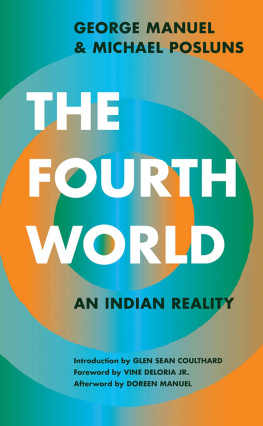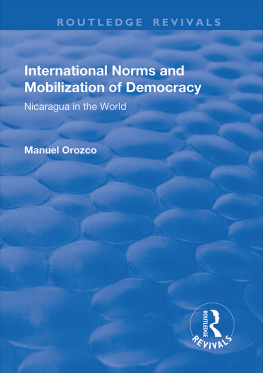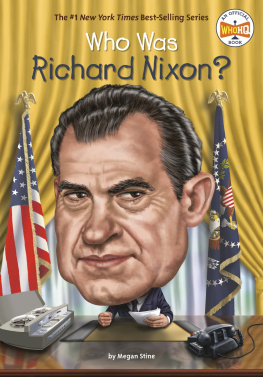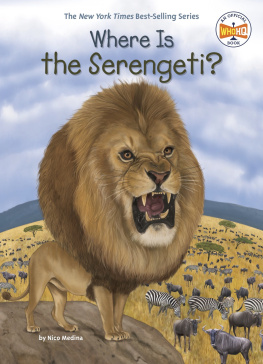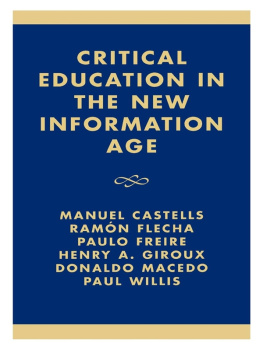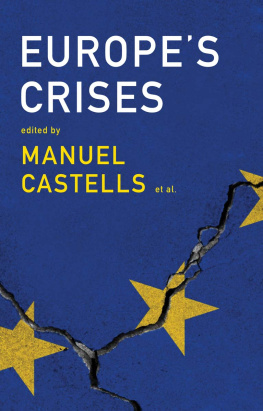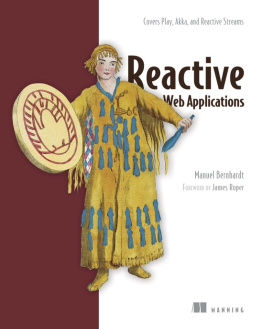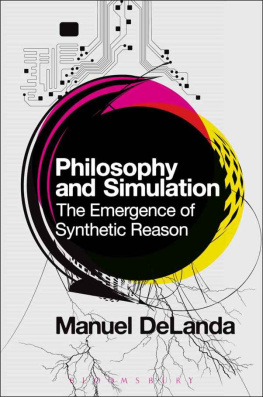George Manuel - The Fourth World
Here you can read online George Manuel - The Fourth World full text of the book (entire story) in english for free. Download pdf and epub, get meaning, cover and reviews about this ebook. year: 2019, publisher: University of Minnesota Press, genre: Politics. Description of the work, (preface) as well as reviews are available. Best literature library LitArk.com created for fans of good reading and offers a wide selection of genres:
Romance novel
Science fiction
Adventure
Detective
Science
History
Home and family
Prose
Art
Politics
Computer
Non-fiction
Religion
Business
Children
Humor
Choose a favorite category and find really read worthwhile books. Enjoy immersion in the world of imagination, feel the emotions of the characters or learn something new for yourself, make an fascinating discovery.
- Book:The Fourth World
- Author:
- Publisher:University of Minnesota Press
- Genre:
- Year:2019
- Rating:4 / 5
- Favourites:Add to favourites
- Your mark:
- 80
- 1
- 2
- 3
- 4
- 5
The Fourth World: summary, description and annotation
We offer to read an annotation, description, summary or preface (depends on what the author of the book "The Fourth World" wrote himself). If you haven't found the necessary information about the book — write in the comments, we will try to find it.
The Fourth World — read online for free the complete book (whole text) full work
Below is the text of the book, divided by pages. System saving the place of the last page read, allows you to conveniently read the book "The Fourth World" online for free, without having to search again every time where you left off. Put a bookmark, and you can go to the page where you finished reading at any time.
Font size:
Interval:
Bookmark:
The Fourth World

An Indian Reality
GEORGE MANUEL AND MICHAEL POSLUNS
INTRODUCTION BY GLEN SEAN COULTHARD
FOREWORD BY VINE DELORIA JR.
AFTERWORD BY DOREEN MANUEL

Map by Maralyn Horsdal and Frank Zsigo
Originally published in 1974 by The Free Press
Published in 2019 in the United States by the University of Minnesota Press
Copyright 1974 by George Manuel and Michael Posluns
Introduction copyright 2019 by Glen Sean Coulthard
Afterword copyright 2019 by Doreen Manuel
All rights reserved. No part of this publication may be reproduced, stored in a
retrieval system, or transmitted, in any form or by any means, electronic, mechanical,
photocopying, recording, or otherwise, without the prior written permission of
the publisher.
Published by the University of Minnesota Press
111 Third Avenue South, Suite 290
Minneapolis, MN 55401-2520
http://www.upress.umn.edu
Printed in the United States of America on acid-free paper
The University of Minnesota is an equal-opportunity educator and employer.
25 24 23 22 21 20 19 10 9 8 7 6 5 4 3 2 1
Library of Congress Cataloging-in-Publication Data
Names: Manuel, George, author. | Posluns, Michael, author.
Title: The Fourth World: an Indian reality / George Manuel and Michael
Posluns; foreword by Vine Deloria Jr.; introduction by Glen Sean
Coulthard; afterword by Doreen Manuel.
Description: Minneapolis, Minnesota: University of Minnesota Press, [2019]
Includes bibliographical references and index.
Identifiers: LCCN 2018020840 | ISBN 978-1-5179-0606-1 (pb)
Subjects: LCSH: Indians of North AmericaCanadaGovernment relations.
Classification: LCC E92. M36 2018 | DDC 323. 1197/071dc23
LC record available at https://lccn.loc.gov/2018020840
These words are written for my grandchildren and for their childrens children.
G.M.
To the memory of three grandfathers who do not otherwise appear in the story: Abraham Posluns, Samuel Brenzel, and John McIlvride. Stories about Zeide Posluns and my recollections of Zeide Brenzel and Granda McIlvride nurtured in me the feelings that we have both tried to convey in this book.
M.P.
This edition is dedicated to land, air, and water defenders who protect our Aboriginal title and Indigenous rights from the colonization of deforestation, mining, and pipelines.
DM.
GLEN SEAN COULTHARD
The Fourth World
VINE DELORIA JR.
DOREEN MANUEL
GLEN SEAN COULTHARD
OVER THE PAST ten to fifteen years, Indigenous resurgence has emerged as a central theoretical framework in much Indigenous writings on colonization and decolonization. Resurgence calls on Indigenous people and communities to combat the violence of colonial social relations through the revitalization of Indigenous epistemologies, political structures, and place-based economic practices. As an ethicopolitical practice, resurgence demands that we decolonize on our own terms, to quote one of its core theorists, Nishnaabeg scholar and activist Leanne Betasamosake Simpson, without the sanction, permission, or engagement of the state. For Simpson, then, resurgence must be vigilantly global in scope, both ethically and politically.
Secwepemc leader George Manuels foundational book The Fourth World: An Indian Reality (cowritten with Michael Posluns and provides an early, paradigm-setting example of Simpsons resurgent internationalism. Indeed, the theoretical cross-fertilizations Manuel draws between the Third and Fourth worlds are productive precisely because of their grounding in the normative frameworks informed by Indigenous connections to land and place. The same goes for Manuels critique of colonization and his views on decolonization: as a globally layered and interconnected phenomenon, settler-colonization operates simultaneously at the local, national, and international levels, intersecting with other colonial social formations and relationships. For Manuel, this requires that we confront the violence of colonialism at all scales of operation, with the support of and in solidarity with all those affected by it. Manuel spent most of his life putting these insights into practice.
This new Introduction to the long-awaited republication of The Fourth World by the University of Minnesota Press will situate the text in the historical ideological and political context within which it intervened, both domestically and internationally. It is productive to read the book as a crucial Indigenous intervention into the ideological influence that the decolonization struggles of the Third World had on the North American lefts critique of racial capitalism and imperialism in the 1960s and early 1970s. I suggest that the inherited conceptual apparatus associated with this turn to the Third World provided Indigenous organizers with an appealing international language of political contestation structured around the concept of self-determinationeconomically, politically, and culturallythat they not only inherited but also fundamentally adapted and transformed through a critical engagement with their own local, land-informed situations. Despite this intervention, the right of self-determination has since been interpreted, indeed institutionalized, in such a politically narrow manner at both international and domestic levels as to render its critical purchase minimal, at least in relation to the transformative potential of its original articulation and aspirations.
The fact that The Fourth World is only now being reissued for the first time since its original publication in 1974 is shocking given that it is unquestionably one of the core texts in the wave of Red Power literature that emerged from the tumultuous politics of the global 1960s and 70s. Such core books (all of which, to my knowledge, are still in print) include Vine Deloria Jr.s classic Custer Died for Your Sins: An Indian Manifesto (1969; Deloria wrote the original Foreword for The Fourth World, reprinted here); Harold Cardinals The Unjust Society (1970); Maria Campbells Halfbreed (1973); Vine Deloria Jr.s Behind the Trail of Broken Treaties: An Indian Declaration of Independence (1974); Howard Adamss Prison of Grass: Canada from a Native Point of View (1975); Lee Maracles autobiographical Bobbi Lee: Indian Rebel (1975); Roxanne Dunbar-Ortizs The Great Sioux Nation (1977); Leslie Marmon Silkos critically acclaimed novel Ceremony (1977); and Jack Forbess Columbus and Other Cannibals (1978). Like many of these texts, The Fourth World tells the story of North Americas genocidal invasion from the vantage point and lived experience of the colonized, as well as the resistance that Native peoples mounted to it. Unlike many observers of the day, Manuel refused to characterize this period of intellectual production as a new Indian resistance (69). For Manuel, such a characterization made the erroneous assumption that Indigenous peoples had accepted, until only recently, the theft of their lands and the usurpation of their sovereignty. The fact of the matter is, writes Manuel unequivocally, that there was never a time since the beginning of colonial conquest when Indian people were not resisting (69).
Next pageFont size:
Interval:
Bookmark:
Similar books «The Fourth World»
Look at similar books to The Fourth World. We have selected literature similar in name and meaning in the hope of providing readers with more options to find new, interesting, not yet read works.
Discussion, reviews of the book The Fourth World and just readers' own opinions. Leave your comments, write what you think about the work, its meaning or the main characters. Specify what exactly you liked and what you didn't like, and why you think so.

